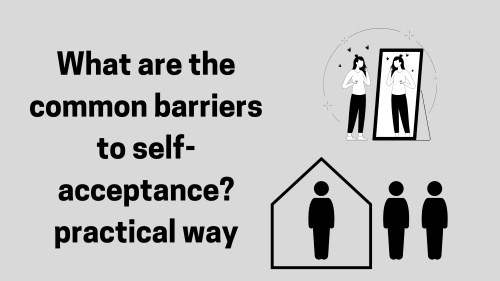
What are the common barriers to self-acceptance, and how can you overcome them?
- Understanding Self-Acceptance
- Common Barriers to Self-Acceptance
- Strategies to Overcome Barriers to Self-Acceptance
Introduction
Self-acceptance is a vital component of psychological health and personal development. It entails accepting, without passing judgment, every facet of who you are, strengths and flaws included. However, several internal and external obstacles might make it challenging to achieve self-acceptance.
This article examines typical barriers to self-acceptance and offers doable solutions so you may lead a more contented and genuine life.
Understanding Self-Acceptance
Self-acceptance: What Is It?
The capacity to accept and love your actual self—flaws and all—is known as self-acceptance. It entails appreciating your own value and self-worth independent of your external situation. Self-acceptance is the cornerstone of self-worth and self-love and is essential to mental wellness in general.
The Value of Acceptance of Oneself
Self-acceptance is necessary for pleasure and personal development. It enables you to create more wholesome relationships, make wiser choices, and deal with obstacles in life more skillfully. If you lack self-acceptance, you could have poor self-esteem, self-doubt, and a persistent desire for outside approval.
Common Barriers to Self-Acceptance
1. Adverse Self-Talk
Negative self-talk is self-deprecating and critical ideas that diminish one’s value. This internal conversation may become entirely embedded and is frequently the result of social conditioning or prior experiences. Negative self-talk distorts one’s perception of oneself and keeps one from realizing one’s worth.
2. The Need for Perfection
Perfectionism is the idea that you must live up to impossible standards to be loved and accepted. Perfectionism may prevent you from enjoying your successes and realizing your value. It also breeds continual self-criticism and a fear of failing.
3. Comparing Yourself to Others
One typical obstacle to self-acceptance is comparing oneself to other people. Social media and cultural expectations frequently exacerbate feelings of inadequacy and jealousy. When you evaluate yourself about other people, you lose sight of your abilities and traits.
4. Previous Trauma
Abuse, neglect, or significant life obstacles are examples of past trauma that can cause ingrained emotions of inadequacy and self-doubt. Emotional wounds from these situations may make embracing and enjoying who you are challenging.
5. Verification from Outside
Dependence on outside validation for one’s value is a noteworthy obstacle. When you look to other people for validation and acceptance, you give up control of your sense of self. This dependence may result in a brittle sense of self-worth that varies according to others’ opinions.
Strategies to Overcome Barriers to Self-Acceptance
1. Engage in Self-Compassion
Being self-compassionate means being friendly and understanding to oneself, even when things are tough. Positive reinforcement and affirmations should replace negative self-talk. Recognize your accomplishments and growth, and tell yourself that making errors is acceptable.
2. Accept Your Imperfection
Recognize that aiming for perfection is unattainable. Accept your flaws and acknowledge that they add to your individuality. Honor your accomplishments, no matter how little, and put more emphasis on advancement than perfection.
3. Keep Comparisons Limited
Spend less time on social media and other websites that promote comparison. Set personal objectives based on your beliefs and desires and keep your attention on your trip. Recognize the distinctiveness of your journey and the advantages you provide.
4. Get over Old Traumas
If your ability to accept yourself by prior trauma and get professional assistance. Support groups, counseling, and therapy can offer the resources and encouragement needed for healing. A more positive self-image can be achieved by acknowledging and analyzing what can be completed before events.
5. Promote Internal Verification
Develop internal validation rather than pursue external validation. Acknowledge and validate your value without regard to others’ views. Participate in happy and fulfilling activities and make self-care a regular habit.
Conclusion
Overcoming obstacles to self-acceptance requires perseverance, self-awareness, and dedication. You may strengthen your foundation for self-acceptance by addressing negative self-talk, accepting imperfection, avoiding comparisons, recovering from prior trauma, and developing internal validation.
Recall that accepting yourself is more about appreciating and acknowledging who you are than being flawless. Accept your individuality and allow it to lead you to a more genuine and satisfying existence.
